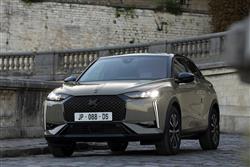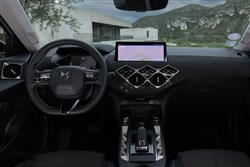DS 3 E-TENSE - ABC Leasing
FUTURE TENSE(some text hidden)
By Jonathan Crouch
Ten Second Review word count: 66
Here's a car that taps into a couple of the fastest growing trends in the automotive market: those for full-electric vehicles and small SUVs. The DS 3 E-TENSE might have an awkward name but on paper at least, it promises to bring buyers some of the best things from both of these market genres. And it's another model that hopes to move the DS brand forward.
Background word count: 119
DS used to use 'E-TENSE' branding across its line-up, which was a bit confusing because some of the models concerned were Plug-in Hybrids and others (specifically this little DS 3 E-TENSE) were full-EVs. Now though, the brand reserves its E-TENSE badge for full-electric power. At its launch in 2019, this DS 3 E-TENSE was the first full-battery-powered small SUV on the market. And one of the first of many. It uses the same all-electric engineering we've subsequently also seen in other Stellantis Group products in this segment, like the Vauxhall Mokka and Peugeot's E-2008. In 2023 though, thanks to a redesigned electric motor and a gutsier 54kWh battery, the EV proposition was usefully improved. Let's take a closer look.
Driving Experience word count: 313
This all-electric 'E-TENSE' variant is made possible due to the fact that the CMP platform that the DS 3 sits upon has, rather cleverly, been engineered to accept both conventional and full-battery powertrains. In 2023, the DS 3 E-TENSE gained a completely new 155hp electric motor (up from 132hp before and assembled in Tremery-Metz), a revised reduction gear set-up (produced in Valenciennes) and a slightly bigger 54kWh battery (assembled in Poissy) for increases in power and range (now rated at up to 248 miles). As before, a system for recovering energy during acceleration and braking is included, with effectiveness you can maximise via two driver-activated energy recovery settings - 'Normal' and 'Brake'. A DS 3 E-TENSE also offers three main selectable driving modes - 'Eco', 'Normal' and 'Sport', the last of which delivers the powertrain's maximum 260Nm torque figure to the tarmac the instant the wheels begin to turn. Which is why, despite the fact that this electric derivative tips the scales at over one and a half tonnes, rest to 62mph can be dispatched in 9s on the way to 93mph. Of course, drive like that too often and you're not going to get anywhere near the improved WLTP-rated driving range of 250 miles. The battery weighs 350kg, but compared to the petrol version of this model, the car's kerb weight has risen by only 300kg - all of this mass low and centralised - because the engine and its ancillaries are no longer needed. All EVs are quiet, but many suffer from wind noise and tyre roar; there's little of that here. What you do get - to meet the current trend - is plenty of semi-autonomous driving technology on offer (most of it optional). The available 'DS Drive Assist' package combines 'Active Cruise Control' and 'Lane Keeping Assist' in a form that sees the vehicle managing both steering and speed.
Pictures (High res disabled)

.jpg)
.jpg)
.jpg)
.jpg)
.jpg)
.jpg)
.jpg)
.jpg)

Scoring
Category: Compact Car
| Performance | |
| Handling | |
| Comfort | |
| Space | |
| Styling | |
| Build | |
| Value | |
| Equipment | |
| Economy | 80% |
| Depreciation | 50% |
| Insurance | 70% |
| Total | 65% |